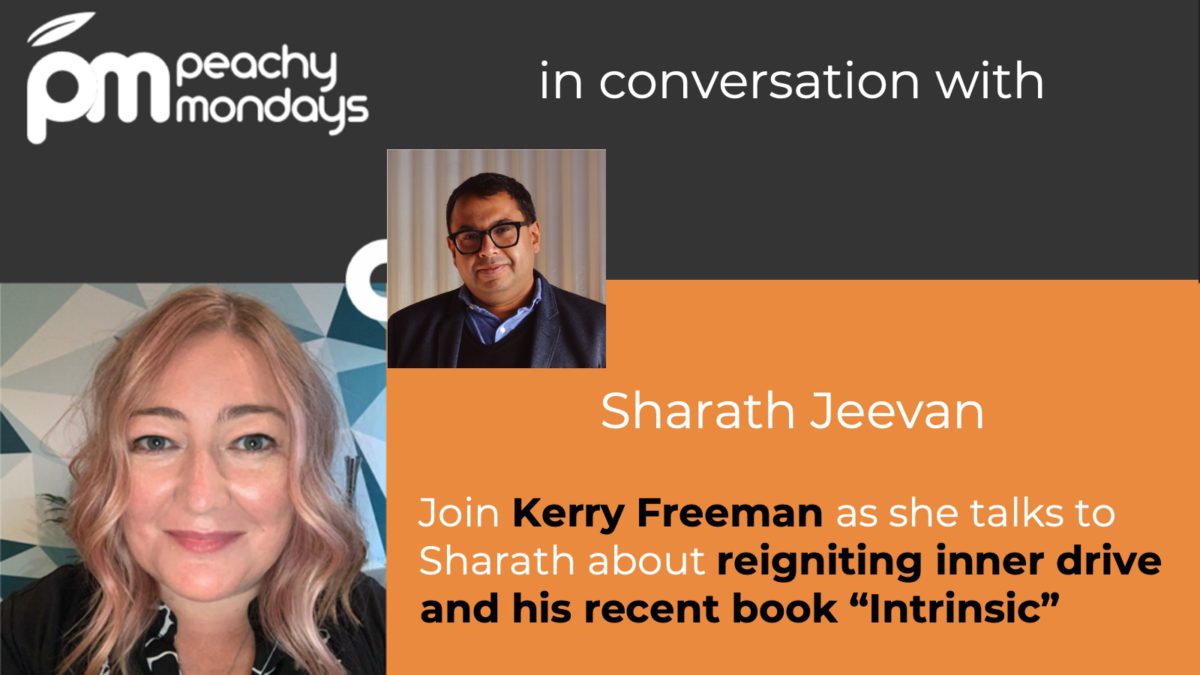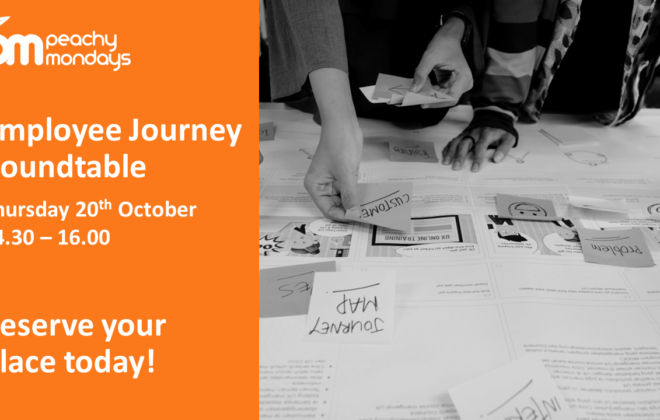Kerry Freeman in conversation with Sharath Jeevan
Our second Peachy Mondays Conversation was with Sharath Jeevan – author of ‘Intrinsic – A Manifesto to Reignite our Inner Drive’ and it’s all about fostering intrinsic motivation. You can listen to the podcast of conversation here or watch the interview on Youtube, or read on for the highlights!
Welcome to Peachy Mondays Conversations – Tell us a bit about yourself Sharath…
My work is all about helping leaders and organisations navigate the most important inflection moments, moments where their root question is about what the next mountain is to climb. There’s a lot of uncertainty, a lot of external change and internal change to navigate. There is no right answer. How do you set direction in that, in that context? How do you nurture the potential of your team?
I do it with a range of organisations from large companies like L’Oreal or Shopify, all the way through to civil service organisations, to universities and to public sector organisations as well.
I started my career in the corporate world working for large brands and after about 12 years in the corporate space, I became a social entrepreneur and a CEO myself, founding two education organisations and have been doing this for the last 15 years
From that, I learned how challenging leadership was and how difficult it is being in the ring as a CEO, and I really wanted to devote this chapter of my life, to helping other leaders who are in that ring, fight better.
I think a lot of us do get trapped playing the game of someone else, and not quite fighting in their own way.
As an immigrant to this country, the UK, I spent 12 years very much playing a conventional game of copying others and trying to judge success, very extrinsically, very externally, based on status and to some extent, money and so on as well.
I think that what really changed my mind, is seeing so many people who went to the top universities who ended up not that happy in what they do, not that excited, not that fulfilled.
You must be willing to step back and talk about your purpose. What does that mean? How will I help and serve others? How do I get lost in something bigger than myself? It takes a lot more conscious effort. I’ve gone through three or four career changes over these past years, but there’s been an overall sort of ‘North Star’ to work with – and as a result, I can have much more impact and feel much more fulfilled in my own work.
One of the things you talk about in Intrinsic is how modern society or societal shifts have put more of an emphasis on extrinsic motivation.
I think we want to achieve results and that’s understandable, but often we try and get to the results rather than thinking about what the intermediate outcomes are, the things in between, the things that will make the results sustainable.
A lot of modern business now is really predicated on this idea of gaming. There’s a target – maybe it’s profit/sales/turnover and we basically game the system to achieve that target and it becomes an empty, hollow thing and we’ve been driven almost entirely by the incentive.
As a result, we do all kinds of things that are not congruent with who we are. They don’t command respect in the marketplace, they certainly don’t command the trust and alignment of our teams
How do we try and build a sense of purpose, of helping and serving others in our work as leaders?
How do we build deep autonomy so that we feel that employees can work in a way that really feels right for them and their own strengths and their own uniqueness as an individual?
Then how do we build mastery where employees and our teams can feel like they’re developing in lots of ways, not just in technical areas?
Most of all, if we don’t walk the talk ourselves, our employees and our teams are not going to follow suit.
What other types of skills do you think we might need to develop more because of AI?
One pattern that keeps coming up is how leaders spend their time.
If you think about a clock with the hour hand, the minute hand and the second hand.
Leaders should be spending most of their time on the hour hand, that five-to-ten-year view of where our organisations or teams should go. They should spend a little bit of time on the minute hand, which is the 18-month to two-year view and almost no time on the second hand, the next six months or even the next month or so.
It’s almost the opposite way around from what I’ve seen so many leaders do now.
With AI as an assistant, it can help us take out some of that short-term noise and focus more on the long term. Focus on inspiring people, building that sense of connection and alignment, coaching and nurturing, building out authenticity in our teams, really helping create a culture of excellence, collaborating, influencing better and really navigating these uncertain periods of inflection.
That’s the hallmark of the leaders we’ll need to be in the future.
I often think about like ‘big P’ and ‘small p’ purpose. What’s happened with many companies now, with ESG trend, has been we think about very big issues, climate change being the best example – that’s the ‘big P’
Yet I just see so many ways in which customers, day in and day out, are treated very, very badly. The ‘small p’ purpose of helping and serving others each day, that relentless focus that really helps deliver for the people that we serve through the products and services we provide. That’s the most important thing we can do and if we can align our teams around that there’s huge potential.
At Peachy Mondays we talked about ‘conscious quitting’ in our last roundtable. What has your experience been where there’s a mismatch between organisational values and personal values?
I do think conscious/quiet quitting has been misinterpreted, the symptoms are too much of a surface level. We’ve tried to do things like incentives to go back into the office. Those are important, but they’re mostly hygiene factors. They are the things that will reduce demotivation, but they won’t create deep motivational alignment.
The truth is, we can’t motivate someone else, but we can create the conditions as a leader, for someone to find the motivation, to find those intrinsic drivers of purpose, autonomy and mastery.
We need to have much deeper conversations with our teams, not these just surface-level things around pay and conditions.
One of my clients has a wonderful practice where he takes the Gallup 10 questions, and they talk about the answers together. The questions matter, but it’s more about the feedback loops and the sense of space, and the sense of both sides, the leader of the employer and the employee crafting and creating the work environment together.
Sometimes in questions, we go very micro, very much the individual employee, but it’s also important to talk about where the company’s going. It’s the alignment.
Do you feel aligned? Do you fully understand and buy into the company’s overall direction?
Do you feel your potential is being fully nurtured?
Do you feel there’s a culture where you can find your own motivation?
Do you feel able to learn and grow and develop?
It’s more the conversations around the questions that really matter and the ability to act on that and do things differently.
If you would like to improve employee engagement outcomes for your organisation please Book a meeting today.
If you’ve found this article helpful, please sign up for our blog and stay informed of the latest insights from Peachy Mondays.
Related Posts
Categories
- Case Study (13)
- Change and transformation (21)
- Connectedness (4)
- Culture (17)
- Design (10)
- Diversity and Inclusion (1)
- Effectiveness (16)
- Employee engagement (60)
- Employee experience (43)
- Employee Feedback (51)
- Employee Wellbeing (1)
- Events (10)
- Financial Wellbeing (1)
- Happiness (4)
- Internal Communications (10)
- News (24)
- Onboarding (1)
- Organisational Effectiveness (18)
- Uncategorized (3)




